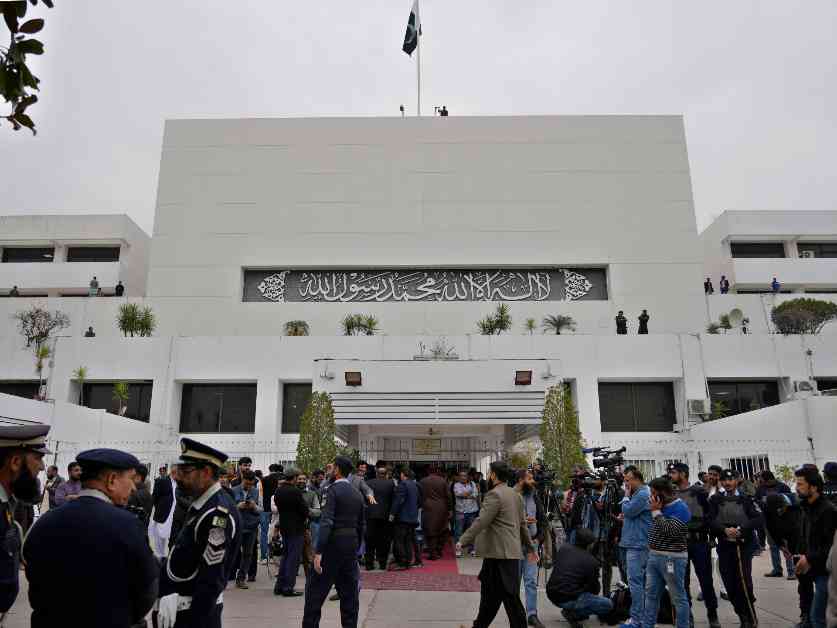Understanding Pakistan’s Controversial Constitutional Amendments
The political landscape in Pakistan has been rocked by proposed constitutional amendments that seek to grant the political executive more power over the judiciary. The government’s push for these changes has sparked a fierce debate between the ruling party and the opposition, with Prime Minister Shehbaz Sharif’s administration failing to secure support for its “Constitutional Package” during a recent political showdown in Islamabad.
Despite facing resistance from opposition parties, the government remains steadfast in its commitment to pursuing the proposed reforms. The opposition, led primarily by the Pakistan Tehreek-e-Insaf (PTI) party under the leadership of incarcerated former Prime Minister Imran Khan, has vehemently criticized the amendments as unconstitutional. They claim that no draft of the proposed changes has been shared with them or the public.
Key Proposals and Controversies
The government’s proposed constitutional amendments encompass over 50 suggestions, with a primary focus on reforms within the judiciary. One of the most significant proposals is the establishment of a new Federal Constitutional Court to work alongside the existing Supreme Court. The Constitutional Court would be tasked with adjudicating cases related specifically to the interpretation of constitutional provisions.
Additionally, the amendments include plans to raise the retirement age of judges in the proposed Constitutional Court to 68, extend the term limit for judges in this court to three years, and grant the president the authority to appoint the chief justice of the Constitutional Court based on the prime minister’s recommendation.
Another contentious proposal aims to overturn a Supreme Court ruling from May 2022, which invalidated individual legislators’ votes against their party’s directives. The amendments seek to allow lawmakers to vote independently of their party lines in parliament.
Parliamentary Numbers Game
In order to pass constitutional amendments in Pakistan, a two-thirds majority in both houses of parliament is required. With 336 seats in the National Assembly and 96 in the Senate, the government needs at least 224 votes in the lower house and 64 in the upper house to enact its proposed changes.
However, Prime Minister Sharif’s coalition government has struggled to secure the necessary votes, falling short by a narrow margin in both the National Assembly and the Senate. Despite this setback, government officials remain optimistic about garnering the required support in the near future.
PTI’s Opposition and Allegations
The PTI, a prominent opposition party in Pakistan, has been vocal in its criticism of the proposed constitutional amendments. Party leader Sayed Zulfi Bukhari has accused the government of rushing to pass the reforms to secure favorable judicial decisions against the PTI and Imran Khan. The PTI asserts that the proposed changes threaten to undermine the independence of the judiciary and pave the way for politically motivated actions against the party.
Imran Khan’s incarceration since August last year on various charges has fueled tensions between the government and the opposition. Despite legal challenges and international criticism of his detention, Khan remains in custody, with recent indications suggesting the possibility of his trial in a military court.
Experts’ Perspectives and Concerns
Political analysts in Pakistan have raised concerns about the potential implications of the proposed constitutional amendments on the balance of power between the executive and the judiciary. Ahmed Ijaz, an Islamabad-based analyst, emphasized the need for careful deliberation in amending the constitution, a process he believes is lacking in the current political discourse.
Benazir Shah, another political analyst based in Lahore, highlighted the timing of the proposed amendments in relation to the upcoming retirement of the chief justice. She expressed apprehensions about potential attempts to influence judicial appointments and diminish the powers of the Supreme Court through the creation of a new Constitutional Court.
Furthermore, Shah pointed out that the proposed amendments could grant significant exemptions to the military, limiting the authority of high courts in matters related to national security. Given the military’s historical influence in Pakistani politics, these provisions raise concerns about potential curbs on judicial oversight of military actions.
In Conclusion
The ongoing debate over Pakistan’s controversial constitutional amendments underscores the complexities of the country’s political landscape and the delicate balance of power between different branches of government. As the government continues its push for reforms and the opposition remains steadfast in its resistance, the future of these proposed changes remains uncertain. Only time will tell how these amendments will impact Pakistan’s democratic institutions and the rule of law.



























